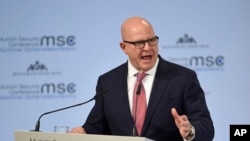Top Russian and American officials exchanged barbs Saturday in Germany over the U.S. indictment of 13 Russians accused of an elaborate plot to disrupt the 2016 presidential election.
H.R. McMaster, U.S. President Donald Trump's national security adviser, said at the Munich Security Conference that the federal indictments showed the U.S. was becoming "more and more adept at tracing the origins of this espionage and subversion."
"As you can see with the FBI indictment, the evidence is now really incontrovertible and available in the public domain," McMaster told a Russian delegate to the conference.
Just minutes before, Russian Foreign Minister Sergey Lavrov had dismissed the indictments as "just blabber," according to remarks through an interpreter.
"I have no response," Lavrov said when asked for comment on the allegations. "You can publish anything, and we see those indictments multiplying, the statements multiplying."
The two men addressed the conference of top world leaders, defense officials and diplomats, giving more general back-to-back opening remarks. But both were immediately hit with blunt questions about the U.S. indictment and the broader issue of cyberattacks.
In Russia, news of the indictments was met with more scorn.
"There are no official claims, there are no proofs for this. That's why they are just children's statements," Andrei Kutskikh, the presidential envoy for international information security, told Russian state news agency RIA Novosti.
McMaster also scoffed at the suggestion that the U.S. would work with Russia on cyber security issues.
"I'm surprised there are any Russian cyber experts available based on how active most of them have been undermining our democracies in the West," he said to laughter. "So I would just say that we would love to have a cyber dialogue when Russia is sincere."
The federal indictment brought Friday by special counsel Robert Mueller represents the most detailed allegations to date of illegal Russian meddling during the campaign that sent Trump to the White House.
Lavrov argued that U.S. officials, including Vice President Mike Pence, have said no country influenced the U.S. election results.
"Until we see the facts, everything else is just blabber — I'm sorry for this expression," Lavrov said.
The indictment charged 13 Russians with running a huge but hidden social media trolling campaign aimed in part at helping Republican Trump defeat Democrat Hillary Clinton.
It outlined the first criminal charges against Russians believed to have secretly worked to influence the U.S. election's outcome.
According to the indictment, the Russian organization was funded by Yevgeny Prigozhin, a wealthy St. Petersburg businessman with ties to the Russian government and Russian President Vladimir Putin.
Lavrov denounced "this irrational myth about this global Russian threat, traces of which are found everywhere — from Brexit to the Catalan referendum."
In Russia, one of the 13 people indicted said that the U.S. justice system is unfair.
Mikhail Burchik was quoted Saturday by the newspaper Komsomolskaya Pravda as saying that "I am very surprised that, in the opinion of the Washington court, several Russian people interfered in the elections in the United States. I do not know how the Americans came to this decision."
Burchik was identified in the indictment as executive director of an organization that allegedly sowed propaganda on social media to try to interfere with the 2016 election.
He was quoted as saying that "they have one-sided justice, and it turns out that you can hang the blame on anyone."




